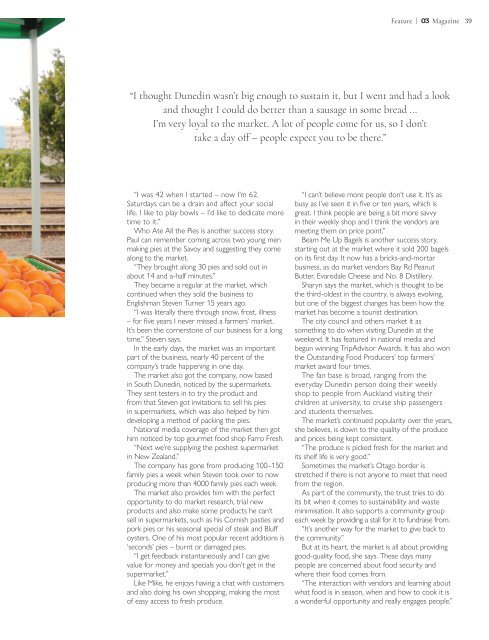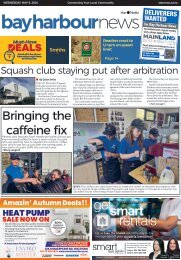03 Magazine: March 31, 2023
You also want an ePaper? Increase the reach of your titles
YUMPU automatically turns print PDFs into web optimized ePapers that Google loves.
Feature | <strong>Magazine</strong> 39<br />
“I thought Dunedin wasn’t big enough to sustain it, but I went and had a look<br />
and thought I could do better than a sausage in some bread ...<br />
I’m very loyal to the market. A lot of people come for us, so I don’t<br />
take a day off – people expect you to be there.”<br />
“I was 42 when I started – now I’m 62.<br />
Saturdays can be a drain and affect your social<br />
life. I like to play bowls – I’d like to dedicate more<br />
time to it.”<br />
Who Ate All the Pies is another success story.<br />
Paul can remember coming across two young men<br />
making pies at the Savoy and suggesting they come<br />
along to the market.<br />
“They brought along 30 pies and sold out in<br />
about 14 and a-half minutes.”<br />
They became a regular at the market, which<br />
continued when they sold the business to<br />
Englishman Steven Turner 15 years ago.<br />
“I was literally there through snow, frost, illness<br />
– for five years I never missed a farmers’ market.<br />
It’s been the cornerstone of our business for a long<br />
time,” Steven says.<br />
In the early days, the market was an important<br />
part of the business, nearly 40 percent of the<br />
company’s trade happening in one day.<br />
The market also got the company, now based<br />
in South Dunedin, noticed by the supermarkets.<br />
They sent testers in to try the product and<br />
from that Steven got invitations to sell his pies<br />
in supermarkets, which was also helped by him<br />
developing a method of packing the pies.<br />
National media coverage of the market then got<br />
him noticed by top gourmet food shop Farro Fresh.<br />
“Next we’re supplying the poshest supermarket<br />
in New Zealand.”<br />
The company has gone from producing 100–150<br />
family pies a week when Steven took over to now<br />
producing more than 4000 family pies each week.<br />
The market also provides him with the perfect<br />
opportunity to do market research, trial new<br />
products and also make some products he can’t<br />
sell in supermarkets, such as his Cornish pasties and<br />
pork pies or his seasonal special of steak and Bluff<br />
oysters. One of his most popular recent additions is<br />
‘seconds’ pies – burnt or damaged pies.<br />
“I get feedback instantaneously and I can give<br />
value for money and specials you don’t get in the<br />
supermarket.”<br />
Like Mike, he enjoys having a chat with customers<br />
and also doing his own shopping, making the most<br />
of easy access to fresh produce.<br />
“I can’t believe more people don’t use it. It’s as<br />
busy as I’ve seen it in five or ten years, which is<br />
great. I think people are being a bit more savvy<br />
in their weekly shop and I think the vendors are<br />
meeting them on price point.”<br />
Beam Me Up Bagels is another success story,<br />
starting out at the market where it sold 200 bagels<br />
on its first day. It now has a bricks-and-mortar<br />
business, as do market vendors Bay Rd Peanut<br />
Butter, Evansdale Cheese and No. 8 Distillery.<br />
Sharyn says the market, which is thought to be<br />
the third-oldest in the country, is always evolving,<br />
but one of the biggest changes has been how the<br />
market has become a tourist destination.<br />
The city council and others market it as<br />
something to do when visiting Dunedin at the<br />
weekend. It has featured in national media and<br />
begun winning TripAdvisor Awards. It has also won<br />
the Outstanding Food Producers’ top farmers’<br />
market award four times.<br />
The fan base is broad, ranging from the<br />
everyday Dunedin person doing their weekly<br />
shop to people from Auckland visiting their<br />
children at university, to cruise ship passengers<br />
and students themselves.<br />
The market’s continued popularity over the years,<br />
she believes, is down to the quality of the produce<br />
and prices being kept consistent.<br />
“The produce is picked fresh for the market and<br />
its shelf life is very good.”<br />
Sometimes the market’s Otago border is<br />
stretched if there is not anyone to meet that need<br />
from the region.<br />
As part of the community, the trust tries to do<br />
its bit when it comes to sustainability and waste<br />
minimisation. It also supports a community group<br />
each week by providing a stall for it to fundraise from.<br />
“It’s another way for the market to give back to<br />
the community.”<br />
But at its heart, the market is all about providing<br />
good-quality food, she says. These days many<br />
people are concerned about food security and<br />
where their food comes from.<br />
“The interaction with vendors and learning about<br />
what food is in season, when and how to cook it is<br />
a wonderful opportunity and really engages people.”


















